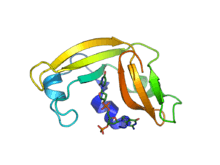Ranpirnase
| Ranpirnase | |
|---|---|
 Crystallographic structure of ranpirnase in complex with RNA.[1] | |
| Identifiers | |
| Organism | |
| Symbol | n/a |
| PDB | 2I5S |
| UniProt | P85073 |
| Other data | |
| EC number | 3.1.27 |
Ranpirnase is a ribonuclease enzyme found in the oocytes of the Northern Leopard Frog (Rana pipiens). Ranpirnase is a member of the pancreatic ribonuclease (RNase A) protein superfamily and degrades RNA substrates with a sequence preference for uracil and guanine nucleotides. Along with amphinase, another leopard frog ribonuclease, ranpirnase has been studied as a potential cancer treatment due to its unusual mechanism of cytotoxicity tested against tumor cells.[2]
Ranpirnase was originally discovered by scientists at TamirBio, a biotechnology company (formerly Alfacell Corporation), where it was tested in clinical trials under the brand name Onconase. The mechanism of action of ranpirnase tumor-selective cytotoxicity has been attributed to the RNA interference pathway, potentially through cleaving siRNA molecules;[3] to cleavage of transfer RNA;[2] and to interference with the NF-κB pathway.[4] Despite early indications of promise as a mesothelioma treatment,[5][6][7] and an orphan drug status designation from the United States Food and Drug Administration in 2007,[8] the Phase III clinical trial for this indication did not demonstrate statistical significance against primary endpoints.[9]
References
- ↑ Lee, J. E.; Bae, E; Bingman, C. A.; Phillips Jr, G. N.; Raines, R. T. (2008). "Structural basis for catalysis by onconase". Journal of Molecular Biology. 375 (1): 165–77. doi:10.1016/j.jmb.2007.09.089. PMC 2151974
 . PMID 18001769.
. PMID 18001769. - 1 2 Ardelt, W; Shogen, K; Darzynkiewicz, Z (2008). "Onconase and amphinase, the antitumor ribonucleases from Rana pipiens oocytes". Current pharmaceutical biotechnology. 9 (3): 215–25. doi:10.2174/138920108784567245. PMC 2586917
 . PMID 18673287.
. PMID 18673287. - ↑ Zhao, H; Ardelt, B; Ardelt, W; Shogen, K; Darzynkiewicz, Z (2008). "The cytotoxic ribonuclease onconase targets RNA interference (siRNA)". Cell cycle (Georgetown, Tex.). 7 (20): 3258–61. doi:10.4161/cc.7.20.6855. PMC 2586937
 . PMID 18927512.
. PMID 18927512. - ↑ Nasu, M; Carbone, M; Gaudino, G; Ly, B. H.; Bertino, P; Shimizu, D; Morris, P; Pass, H. I.; Yang, H (2011). "Ranpirnase Interferes with NF-κB Pathway and MMP9 Activity, Inhibiting Malignant Mesothelioma Cell Invasiveness and Xenograft Growth". Genes & Cancer. 2 (5): 576–84. doi:10.1177/1947601911412375. PMC 3161417
 . PMID 21901170.
. PMID 21901170. - ↑ Costanzi, J; Sidransky, D; Navon, A; Goldsweig, H (2005). "Ribonucleases as a novel pro-apoptotic anticancer strategy: Review of the preclinical and clinical data for ranpirnase". Cancer Investigation. 23 (7): 643–50. doi:10.1080/07357900500283143. PMID 16305992.
- ↑ Mikulski, S. M.; Costanzi, J. J.; Vogelzang, N. J.; McCachren, S; Taub, R. N.; Chun, H; Mittelman, A; Panella, T; Puccio, C; Fine, R; Shogen, K (2002). "Phase II trial of a single weekly intravenous dose of ranpirnase in patients with unresectable malignant mesothelioma". Journal of Clinical Oncology. 20 (1): 274–81. doi:10.1200/jco.20.1.274. PMID 11773179.
- ↑ Vogelzang, N. J.; Rusthoven, J. J.; Symanowski, J; Denham, C; Kaukel, E; Ruffie, P; Gatzemeier, U; Boyer, M; Emri, S; Manegold, C; Niyikiza, C; Paoletti, P (2003). "Phase III study of pemetrexed in combination with cisplatin versus cisplatin alone in patients with malignant pleural mesothelioma". Journal of Clinical Oncology. 21 (14): 2636–44. doi:10.1200/JCO.2003.11.136. PMID 12860938.
- ↑ Waknine, Yael. "New FDA Orphan Drugs: Gestiva, Onconase, Aerosolized Ciprofloxacin". Medscape. Retrieved 2 February 2015.
- ↑ "Alfacell Annual Report 2009" (PDF). Retrieved 2 February 2015.